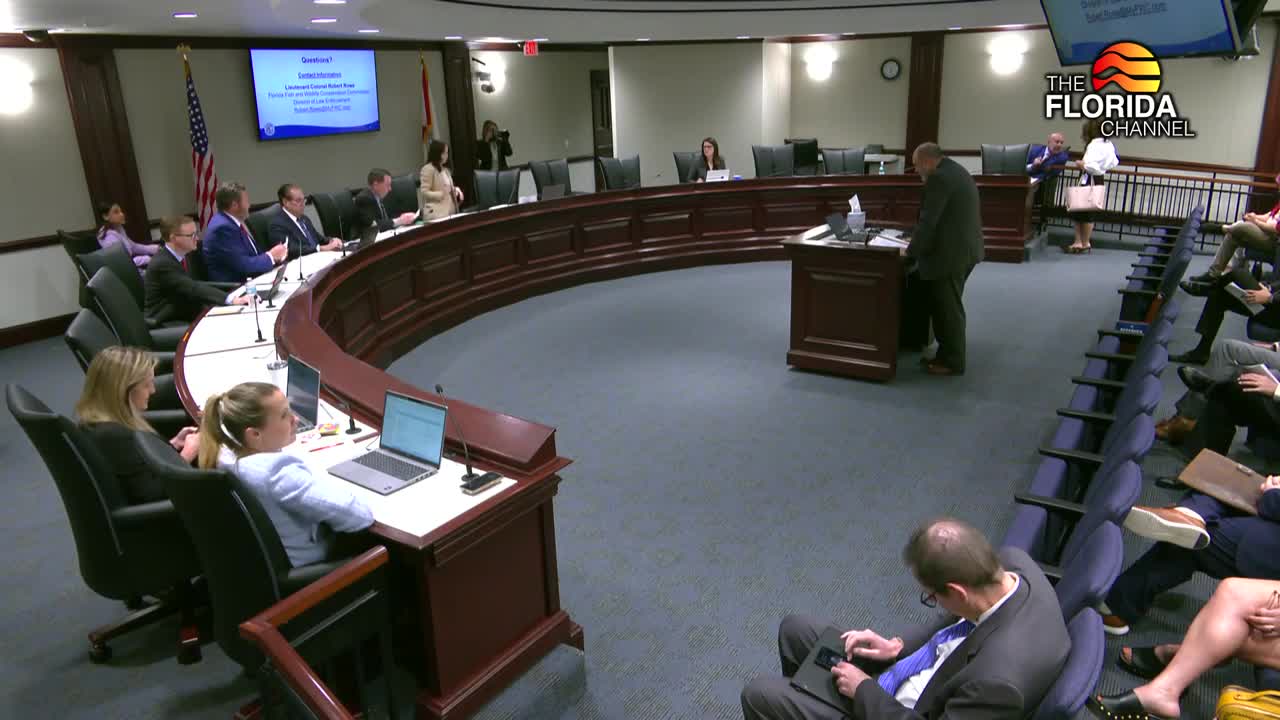FWC outlines livery permit rules, reporting and enforcement under SB 606 implementation
Get AI-powered insights, summaries, and transcripts
Subscribe
Summary
Lieutenant Colonel Robert Rowe of the Florida Fish and Wildlife Conservation Commission told the Appropriations Committee on Criminal and Civil Justice that liveries—businesses that advertise and rent vessels without providing a captain or crew—must hold a no‑cost FWC permit and meet insurance, safety‑gear, education and reporting requirements under the implementation of CS for SB 606 (Boating Safety Act of 2022).
Lieutenant Colonel Robert Rowe of the Florida Fish and Wildlife Conservation Commission told the Appropriations Committee on Criminal and Civil Justice that liveries—businesses that advertise and rent vessels without providing a captain or crew—must hold a no-cost FWC permit and meet insurance, safety-gear, education and reporting requirements under the implementation of CS for SB 606 (Boating Safety Act of 2022).
Rowe said the permit requirement, effective Jan. 1, 2023, has given FWC an accurate statewide count of liveries and enabled targeted enforcement, particularly across Miami-Dade, Broward and Monroe counties.
Rowe summarized the core requirements and enforcement posture. He said liveries are regulated under Florida Statute 327.54 and must: hold the no-cost FWC livery permit; carry the statutory insurance minimums (he gave the figures as $500,000 per person and $1,000,000 per event); stock personal flotation devices sufficient for maximum vessel capacity; maintain required onboard safety gear (for example, fire extinguishers and horns); display standardized safety placards (minimum 187 square inches); and keep written rental agreements and signed pre‑rental attestation forms available for 90 days for inspection by law enforcement. "All liveries are required to have a permit," Rowe said.
Rowe described staff and renter education requirements: all staff who give pre‑rental instruction must complete a NASBA‑approved boater education course, and the statutory exemptions to boater education (including people born before Jan. 1, 1988, U.S. Coast Guard license holders, and other statutory exemptions) still apply to individuals unless state law is changed. Rowe said temporary certificates are valid for 90 days and may be issued online or by a permitted livery that is authorized to provide the temporary certificate test.
Reporting duties and enforcement penalties were a major focus. Rowe said liveries must report rented vessels that are overdue by more than four hours, and they must report vessel accidents involving rented vessels to FWC or law enforcement. Penalties described in the presentation include: a first‑degree misdemeanor for operating without a permit and a second‑degree misdemeanor for other violations, with enhanced fines and suspension for repeat offenders (Rowe cited a minimum $500 fine after prior convictions, $1,000 after multiple convictions, and a 90‑day suspension for more than one violation within a three‑year period). "They cannot rent a vessel to anyone under the age of 18," Rowe said. He added that since the permit requirement began, FWC has used suspensions and revocations: to date Rowe reported three 90‑day suspensions, one revocation and two pending revocations.
Committee members asked practical questions about the statute and business choices. Vice Chair Martin asked about the boater education requirement; Rowe replied, "So what the statute says is they have to meet minimum requirements for education ... it also can be a temporary certificate. Temporary certificates are good for 90 days." Senators pressed whether a private owner who loans a boat (for example, an Airbnb guest) is treated as a livery: Rowe said the livery statute applies when the owner advertises the vessel for rent; private, non‑advertised loans are not regulated as liveries. Senator Wright noted data showing older operators have a high share of accidents and said that factored into renewed interest in boating safety this session.
Rowe described FWC's coordinated enforcement work with county and municipal law enforcement in South Florida and said the permit rollout has helped identify previously undocumented operators; he noted about 465 permits have been issued for Miami‑Dade, Broward and Monroe counties, which he said represent roughly one‑third of statewide permits. Rowe directed members to FWC's boating safety page for the livery placards and rule text and closed by offering to take questions.
The committee did not take formal action on the presentation; members moved to later agenda items after the Q&A.
